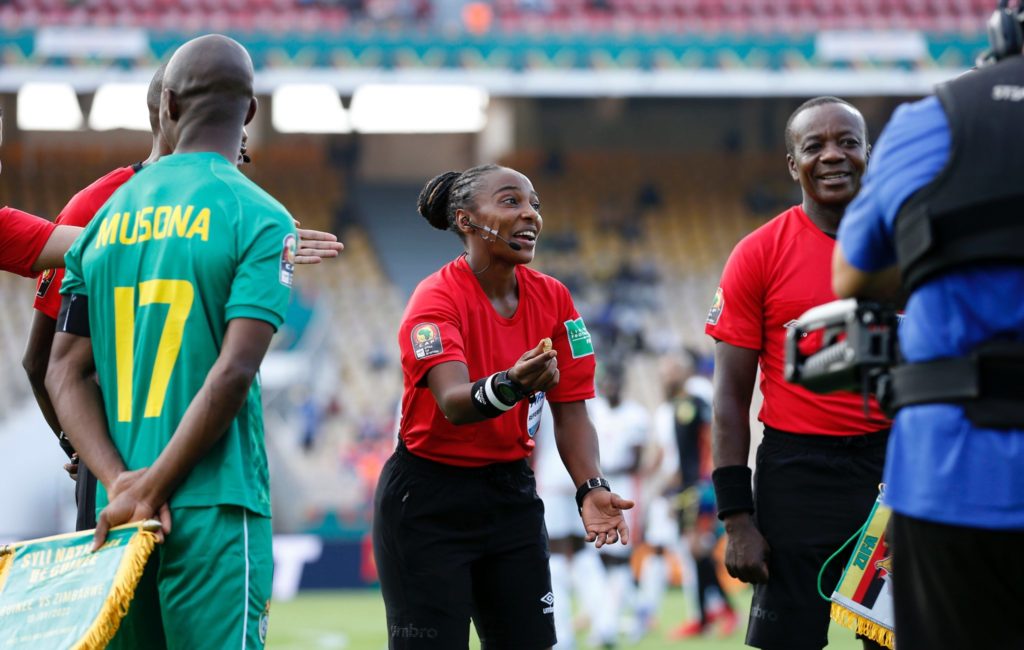Referee Salima Mukansanga has become a trailblazer after she made history when she led out her team of officials at the Africa Cup of Nations in Yaounde, Cameroon, writes former Fifa referee Jerome Damon.
Football has, until a few years ago, always been viewed as a man’s sport. The notion of women playing football, let alone competitively, was not considered as remotely possible – as far as the east is from the west.
Now spare a thought for women in football – especially in Africa where there are still stadiums where some spectators are refused entry simply because of their gender.
Over the past four years, Caf and Fifa have been actively advancing women in football. The Caf Referees Committee, with its director Eddy Maillet at the forefront, has actively pursued the idea of women refereeing in major African competitions.
Following the success of women refereeing trios at the Caf U20, U23 and Chan competitions, the committee took the logical next step by appointing Salima Mukansanga (Rwanda), Carine Atezambong Fomo (Cameroon), Bouchra Karboubi (Morocco – VAR) and Fathia Jermoumi (Morocco – Assistant VAR) to this year’s Africa Cup of Nations.
Was this the right move for Africa? Would the administrators and the footballers accept women in the men’s competition? After all, Caf’s showpiece tournament showcased some of the biggest names in world football – Mo Salah, Sadio Mane, Edouard Mendy, Naby Keita, Achraf Hakimi, to mention a few.
So why Mukansanga? Well, she has proven her abilities at numerous Fifa Competitions, including the 2019 Women’s World Cup in France and last year’s Olympic Games in Tokyo. Her coaches have been so impressed with her abilities and performances that they are tipping her to excel at next year’s Women’s World Cup in Australia and New Zealand.
Having already officiated at the men’s Caf U23 tournament in Egypt in 2019, making the step up to Afcon wasn’t exactly a major adjustment for a motivated and talented referee like the 33-year-old Rwandan.
Mukansanga made history when she led out her team of officials in Yaounde to officiate the group game between Guinea and Zimbabwe. Before the game the atmosphere at the officials’ headquarters was electric. Gathered in the room were her fitness coaches, technical and VAR coaches and, of course, the Caf referees’ director. The circle was completed with compatriot Celestin Ntagungira, Caf’s ref co-chairperson, as her assessor in the stadium.
Every decision was cheered and at every counter-attack, we held our collective breaths. The game was certainly fast and we knew that there could be instances when she may be out of position. But Mukansanga, true to her character, fought for position at every counterattack – she used the refereeing concepts she learned to great effect.
The moment of the match was probably towards the end of the game when she cautioned Liverpool’s Naby Keita, who captained Guinea. This moment stands out for two reasons: Mukansanga had earned her stripes and she was accepted as just another referee. To his credit, Keita responded like a player to a referee where gender did not matter. We all smiled.
When she blew the final whistle, we all rose to our feet, cheered and hugged each other as the tiny Salima Mukansanga of Rwanda carved a huge mark in the history of African football. Her performance vindicated our decision that the best match officials would get the matches – gone are the days of prejudice and bias.



